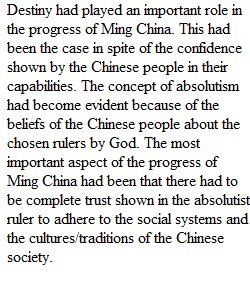


Q Isolationism and Destiny in Ming China COLLAPSE As is evident in the film "The Rise of the Dragon", Ming China did not have to choose a course of isolation. Certainly, this was the most traditional choice to be made, and, as described by Li, in the section from The Ageless Chinese, the movement toward absolutist power on the part of the early Ming Emperors played its part; however, had it not been for problems in the succession following the death of the Yung-lo/Yongle Emperor (not detailed in the Li reading), which lead to a court rivalry for control over the influence of a youth who had succeeded to the throne -- won by his arch-conservative (narrowly ideological) tutors -- the voyages of Zheng He might have brought the Celestial Kingdom into the Atlantic. For this week's 'Discussion', using the available evidence on Ming China from this week's 'Course Materials', I would like students to consider the implications of the fact that in history choices are made (even the avoidance of choosing represents a historical choice), and that often fortuitous circumstances -- like problems in a monarchical succession -- can make choices look like destiny. While it has been popular since Herbert Spencer's publication of Social Darwinism (1870's) to view evolution as an agency of 'progress', Darwin's Origin of the Species (1859) had seen only "chance and necessity". Constrained to the usual 500words for your primary post and 300words for secondary posts (two are required), and substantiated by available evidence, offer your judgment. Just an aside: it was in Spencer's Social Darwinism that the phrase "survival of the fittest" first appeared, and Spencer was talking about humans.
View Related Questions